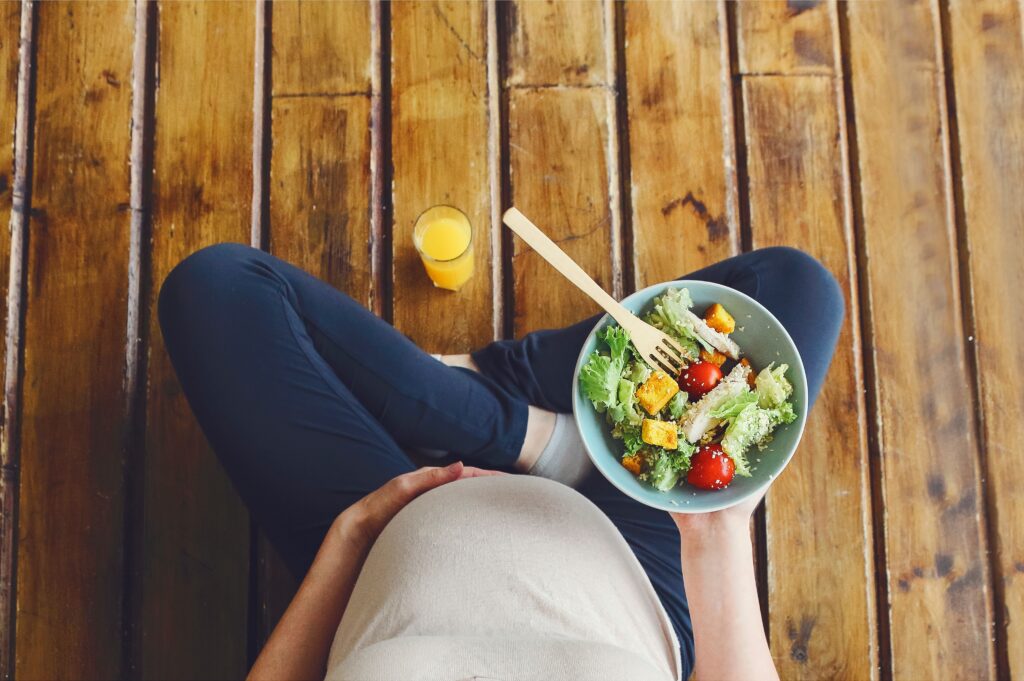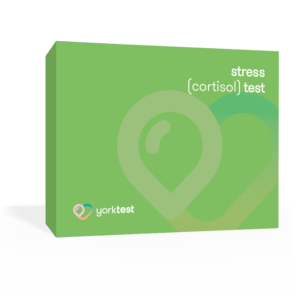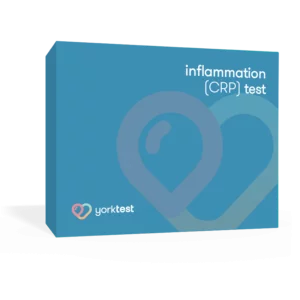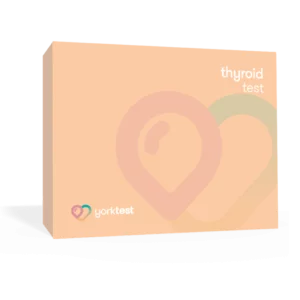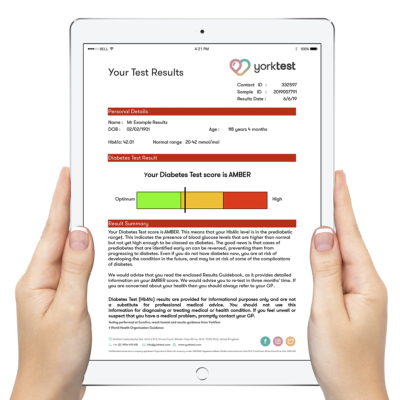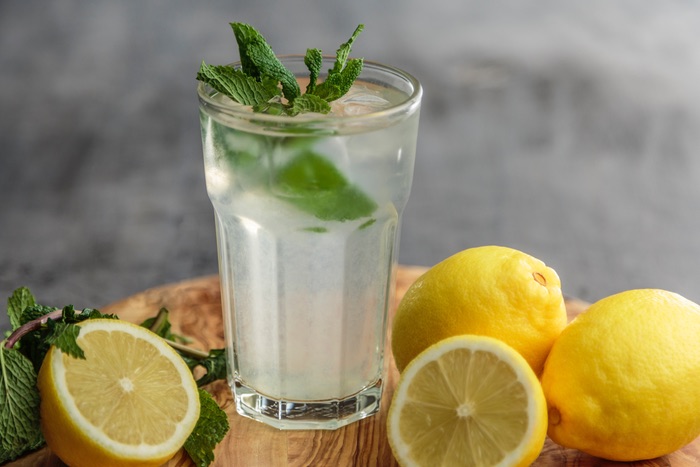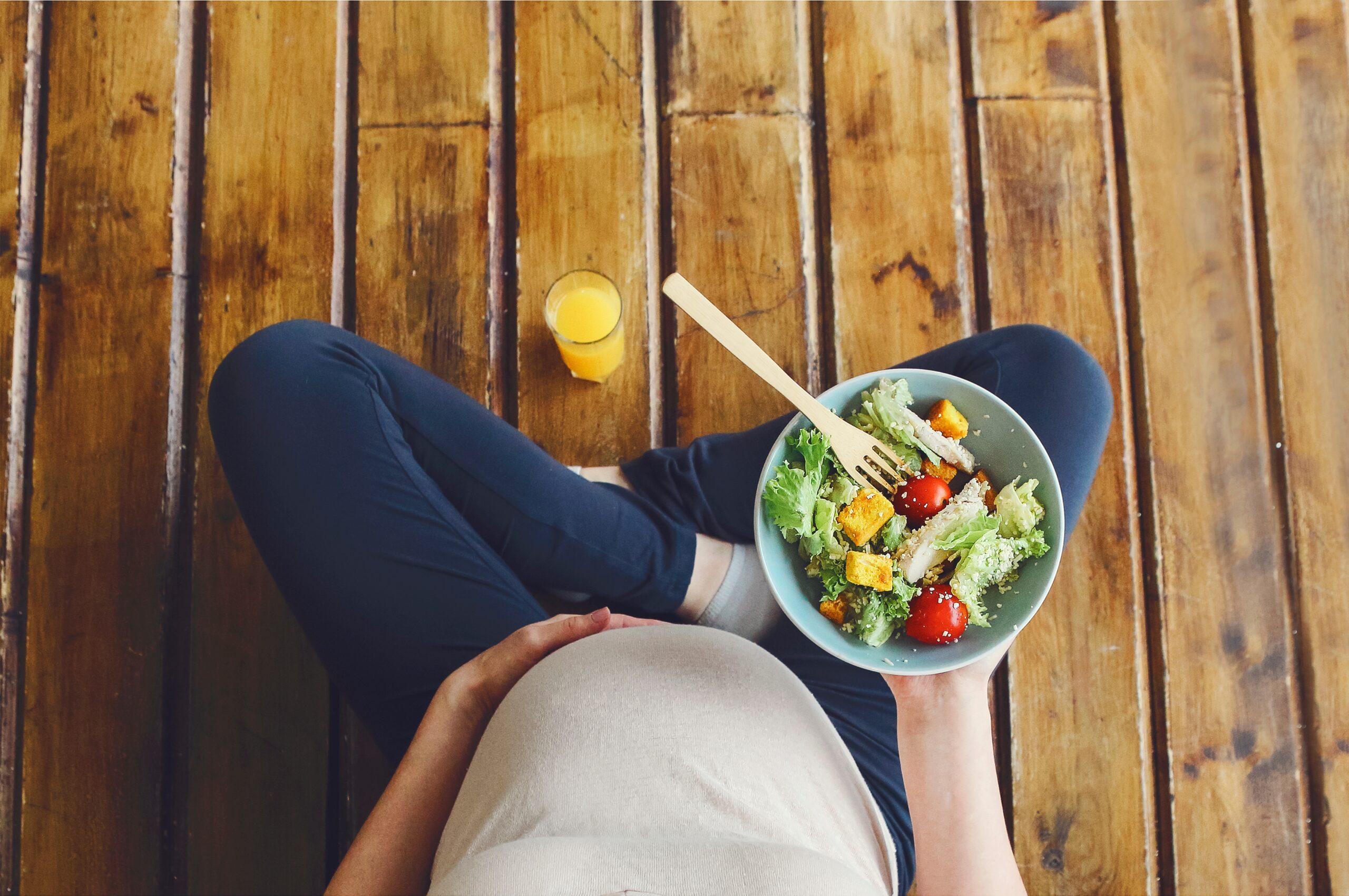- Best Pre-Pregnancy Vitamins and Nutrition
- Folic Acid (Vitamin B9)
- Vitamin D
- Vitamin C
- Iron
- Calcium
- Omega-3 Fatty Acids
- Iodine
- Where Do I Get Pregnancy Supplements?
- Food Poisoning in Pregnancy
- Symptoms
- Risks to the Baby
- Food To Avoid During Pregnancy
- Meat and Poultry
- Reasons To Be Careful
- Dairy Products
- Reasons To Be Careful
- Fish
- Reasons To Be Careful
- Eggs
- Reasons To Be Careful
- Types of Food and Drinks
- Why Is Prenatal Care Important?
Pregnancy is one of the most exciting journeys in life. It’s filled with excitement, anticipation, anxiety, and, of course, a fair share of questions. What symptoms are considered normal? What types of exercises are considered safe? And when will you start to feel the baby move? These are all among the most common concerns of any would-be mother. However, one of the most pressing questions is “what vitamins and nutrition should I be prioritising when pregnant�
As your body nurtures new life, it’s essential to provide the right building blocks for your baby’s growth as well as focusing on your own well-being. Vitamins, nutrition, and prenatal care play a crucial role in ensuring a healthy pregnancy and a strong foundation for your little one’s life.
In this guide, we’ll explore the key aspects of pregnancy nutrition and the role of the best prenatal vitamins, from folic acid to iron and beyond. You’ll also find pre-pregnancy tips to prepare your body for this incredible journey, alongside practical advice on making healthy food choices, balancing your diet, and understanding the importance of regular prenatal check-ups. Whether you’re a first-time parent or adding to your family, this comprehensive guide will help empower you with knowledge and confidence every step of the way.
Best Pre-Pregnancy Vitamins and Nutrition
Before you welcome a new life into this world, it is important to ensure you are consuming the right vitamins and nutrition. While there is no one-size-fits-all regarding the right amounts of vitamins and nutrition, there are some widely accepted guidelines. One such consideration is ensuring you do not take too much vitamin A. Too much vitamin A can harm your baby. So checking precisely what you are consuming is always advised.
Some of the most advised pre-pregnancy vitamins and nutrition include:
Folic Acid (Vitamin B9)
Folic acid, or vitamin B9, is essential to help prevent birth defects known as neural tube defects (these include spina bifida).
Recommended amount: 400 mg daily before pregnancy and all the way up to week 12 of your pregnancy.
Vitamin D
Rather unsurprisingly, Vitamin D is highly recommended for pregnant women. Vitamin D helps regulate the amount of calcium and phosphate in the body, which helps to keep bones, teeth, and muscles stronger and healthier.
Recommended amount: 10mgs daily.
Vitamin C
Vitamin C helps protect and keep cells healthy. Vitamin C also helps strengthen the immune system and helps with iron absorption.
Recommended amount: Between 80–85 mg of vitamin C daily, depending on age. However, it is acknowledged that pregnant women often get enough vitamin C from a balanced diet.
Iron
It will come as no surprise that if you do not get enough iron during your pregnancy, you will probably feel exhausted and may even suffer from anaemia in severe cases. Getting enough iron in your diet helps avoid these concerns by supporting red blood cell production.
Recommended amount: 27 mg daily.
Calcium
Calcium helps support strong bones and teeth in children and babies, and it also helps strengthen bones in the mother.
Recommend amount: 1,000-1,300 mg daily.
Omega-3 Fatty Acids
Omega-3 Fatty Acids are great for pregnant women, providing essential building blocks for the mother and baby. Omega-3 Fatty Acids are particularly beneficial in helping with crucial brain, eye, and nervous system development.
Recommended amount: 200-300 mg daily.
Iodine
Iodine is another essential nutrient for pregnant women. Iodine plays a crucial part in the development of the fetus’s brain and nervous system, as well as thyroid function.
Recommended amount: 150 mg daily.
Where Do I Get Pregnancy Supplements?
If you are pregnant and require supplements, you can usually get them from a pharmacy or supermarket. Alternatively, a GP may prescribe them to you.
Food Poisoning in Pregnancy
Food poisoning is never a pleasant experience, regardless of your physical state. However, suffering food poisoning during a pregnancy can actually be dangerous to both the mother and baby. On top of this, pregnant women are more likely to suffer from food poisoning because of changes in their immune system.
Symptoms
Food poisoning symptoms for pregnant women can vary but often include:
- Nausea and vomiting
- Diarrhoea
- Stomach cramps
- Fever or chills
- Headache
If you experience severe or prolonged symptoms, such as a high fever, bloody diarrhoea, or dehydration, it’s important to contact your healthcare provider as soon as possible.
Risks to the Baby
Food poisoning can cause significant concerns for your baby. Certain foodborne illnesses, such as listeriosis and toxoplasmosis, as well as other complications, can lead to issues like:
- Miscarriage
- Premature DeliveryÂ
- A Variety of Infections – such as meningitis and bacteremia
- Increased Risk of Disabilities
- Low Birth Weight
- Blindness
- Brain, heart, or Kidney Impairments
- Paralysis
- Seizures
While these conditions are not overly common, being wary of potential consequences is always important. As such, prompt and appropriate treatment should be carried out swiftly.
Some of the ways you can help treat food poisoning at home include staying hydrated, eating bland food like bread and rice, and taking pregnancy-safe medications.
Food To Avoid During Pregnancy
Pregnancy is a time to pay extra attention to what you eat, as your diet plays a crucial role in supporting your baby’s growth and development. However, not all foods are safe for consumption during this period. Certain foods can carry risks like harmful bacteria, toxins, or chemicals that may affect your health or your baby’s. Here’s a guide to the foods to avoid during pregnancy and why they should be left off your plate.
While most foods are safe for consumption, it is still advisable to be extra cautious. Some of the foods you need to be wary of include:
Meat and Poultry
It comes as no surprise that you have to be careful with certain meats during pregnancy. You have to be careful with food, such as cold-cured meats, including salami, pepperoni, chorizo, and prosciutto.
However, you should completely avoid raw and uncooked meat, all types of pâté, liver products, and game meats like partridge, goose, or pheasant.
Reasons To Be Careful
Eating raw or undercooked meat carries a small risk of toxoplasmosis, a parasitic infection that can cause miscarriage. Similarly, cured meats (such as salami or prosciutto) are not cooked and may contain parasites that pose the same risk. Liver and liver products are high in vitamin A, which, in excessive amounts, can be harmful to an unborn baby. Additionally, game meats may contain lead shot, which can be unsafe during pregnancy.
Dairy Products
If you are pregnant, you should avoid certain dairy foods made from unpasteurised milk, such as soft-ripened goat’s cheese. You should also avoid mould-ripened soft cheeses with a white rind, such as brie, camembert, and chèvre, as well as soft blue cheeses like Danish blue, gorgonzola, and Roquefort unless they are cooked until steaming hot. Similarly, unpasteurised milk and cream from cows, goats, or sheep can carry harmful bacteria and should be avoided during pregnancy. Opting for pasteurised dairy products is usually the safest choice.
Reasons To Be Careful
Unpasteurised or soft-ripened dairy products carry a small risk of containing Listeria bacteria, which can cause listeriosis, a serious infection that may lead to miscarriage, stillbirth, or severe illness in newborns. Soft cheeses with a white rind, such as brie or camembert, have higher moisture content, creating an ideal environment for bacteria to grow. However, cooking cheese until steaming hot kills harmful bacteria, significantly reducing the risk of listeriosis.
Fish
Fish can cause numerous people a certain amount of complications, including pregnant women. Pregnant women should avoid swordfish, shark, marlin, raw shellfish, and cold-smoked or cured fish.Â
Reasons To Be Careful
Avoid ready-to-eat cold-smoked or cured fish as it may contain listeria, which can cause listeriosis, increasing the risk of miscarriage, stillbirth, or severe illness in newborns. Cooking it until steaming hot eliminates this risk. Limit tuna due to its high mercury content, which can be harmful to the baby, and reduce oily fish intake as it may contain pollutants like dioxins and PCBs. Additionally, avoid raw shellfish, as it can carry harmful bacteria, viruses, or toxins that may cause food poisoning.
Eggs
When it comes to cooks, pregnant women should avoid raw or partially cooked hen eggs that are not British Lion-marked or produced under the Laid in Britain scheme. Pregnant women should also avoid cooked duck, goose, or quail eggs.Â
Reasons To Be Careful
British Lion hen eggs and those from the Laid in Britain scheme have a low risk of salmonella, making them safer to eat raw or lightly cooked. While salmonella is unlikely to harm your baby, it can cause food poisoning. To reduce the risk, all other eggs should be thoroughly cooked before eating.
Types of Food and Drinks
While the above are the main foods to avoid, there are other foods and drinks you must at least be wary of. You don’t actively have to avoid these foods and drinks entirely, but researching exactly how much is ‘safe’ or what potential risks are associated with them is always wise. Some of these foods and drinks include:
- Caffeine and Herbal teas – you don’t have to avoid them entirely; just review usage.Â
- Alcohol – it is strongly recommended to avoid it entirely.Â
- Fruits, vegetables and salads – be careful in case they have soil on them. Washing thoroughly is strongly recommended.
- Enoki Mushrooms – recommended to avoid.
- Liquorice Root – liquorice is fine, but avoid liquorice root entirely.Â
- Vitamins – do not take high-dose multivitamin supplements or any supplements with vitamin A in them.
Why Is Prenatal Care Important?
There are many reasons prenatal care is important, including being essential for ensuring the health and overall well-being of both the baby and mother. Prenatal care plays a pivotal role in identifying problems early on, providing necessary interventions when necessary to ensure a safe pregnancy and delivery, and ultimately giving the baby the best start in life. On top of this is the fact that, statistically, women who don’t receive prenatal care are at higher risk of complications.
If you are interested in learning more about high-quality pregnancy care, then be sure to keep up-to-date with the latest blogs from YorkTest. We have a team of experts who can draw on years of experience to ensure you have the most accurate information and that your baby gets the best start in life. Additionally, if you want to learn more about healthy diet options that can really make a difference to your quality of life, then contact us today.Â


